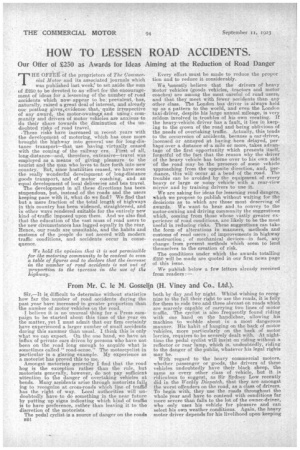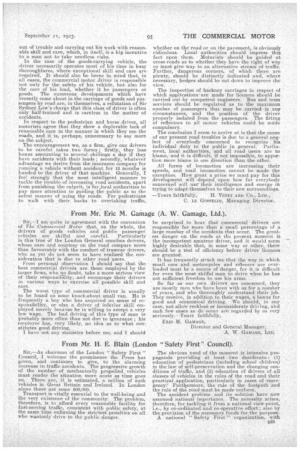From Mr. C. le M. Gosselin (H. Viney and Co., Ltd.).
Page 10

Page 11

If you've noticed an error in this article please click here to report it so we can fix it.
Sir,—It is_ difficult to determine without statistics how far the number of road accidents during the past year have increased in greater proportion than the number of motor vehicles on the road.
I believe it is no unusual thing for a Press campaign to he -started about this time of the year on the matter, yet I must admit that our firm certainly have experienced a larger number of small accidents during this summer than usual. I think this is only what we can expect. On the one hand, we have an influx of private cars driven by persons who have not been on the road long enough to acquire what is sometimes called " road-sense. ' The motorcyclist in particular is a glaring example. My experience as a motorist has proved this to me.
Amongst motorists generally I find that the road hog is the exception rather than the rule, but motorists generally, however, do not pay sufficient attention to the danger of overtaking vehicles at bends. Many accidents arise through motorists failt ing to recognize at cross-roads which line of traffid has the right of way. Local authorities will undoubtedly have to do something in the near future by putting up signs indicating which kind of traffic( is to have preference, rather than leaving it to the discretion of the motorists.
The pedal cyclist is a source of danger on the roads B21 both by day and by night. Whilst wishing to recognize to the full their right to use the roads, it is folly for them to ride two and three abreast on roads which are scarcely capable of carrying two lines of motor traffic. The cyclist is also frequently found riding with one hand on the handlebar, allowing his machine to wobble about in a most dangerous manner. His habit of hanging on the back of motor vehicles, more particularly on the back of motor lorries, requires to be severely dealt with. At nighttime the pedal cyclist will insist on riding without a reflector or rear lamp, which is, undoubtedly, riding to the danger of the public, whatever his legal rightsmay be.
With regard to the heavy commercial motors, whether passenger or goods, the drivers of these vehicles undoubtedly have their black sheep, the same as every other class of vehicle, but it is ridiculous to suggest, as Sir Sydney Low recently did in the Weekly Dispatch, that they are amongst the worst offenders on the road, as a class of drivers. To begin with, they use the roads throughout the whole year and have to contend with conditions far more severe than falls to the lot of the owner-driver, who only uses his vehicle for pleasure and can select -his own weather conditions. Again, the heavy motor driver depends for his livelihood upon keeping out of trbuble and carrying out his work with reason able
able skill and care, which, n itself, is a big incentive to a man not to take needless risks.
In the case of the goods-carrying vehicle, the driver necessarily operates most of his time in busy thoroughfares, where exceptional skill and care 4re required. It should also be borne in mind that, in all cases, the commercial motor driver is responsible not only for the safety of his vehicle, but also for the care of his load, whether it be passengers or goods. The numerous developments which have recently come about in the carriage of goods and passengers by road are, in themselves, a refutation of Sir Sydney Low's charge that this class of driver is often only half-trained and is careless in the matter of accidents.
In respect to the pedestrian and horse driver, all motorists agree that they show a deplorable lack of reasonable care in the manner in which they use the roads, and it is, perhaps, unnecessary to say more on the subject.
The encoura.gement we, as a firm, give our drivers to be careful takes two forms ; firstly, they lose bonus amounting to several shillings a day if they have accidents with their loads ; secondly, whatever advantage we derive from the insurance company for running a vehicle without accident for 12 months is handed to the driver of that machine. Generally, I feel strongly that the most intelligent manner to tackle the trouble of increasing road accidents, apart from punishing the culprit, is forJoral authorities to pay more attention to guiding the public as to the safest manner of using the roads. For pedestrians to walk with their backs to overtaking traffic, whether on the road or on the pavement, is obviously ridiculous. Local authorities should impress this fact upon them. Motorists should be guided at cross-roads as to whether they have the right of way or must give way to an alternative stream of traffic. Further, dangerous corners, of which there a,re plenty, should be distinctly indicated and, where necessary, hedges should be cut down to improve the view.
The inspection of hackney carriages in respect of which applications-are made for licences should be carried out by competent engineers. Bus and tram services should be regulated' as to the maximum number of passengers that may be carried in any circumstances, and the position of the driver properly isolated from the passengers. The fitting Of reflectors to all motor vehicles could be made compulsory.
The conclusion I seem to arrive at is that the cause of our present road troubles is due to a general neglect of everybody concerned to recognize his individual duty to the public in general. Parliament, local authorities, and all road users are to blame, and it is difficult, if not impossible, to apportion inure blame in one _direction than the other.
All forms of locomotion are increasing their speeds, and road locomotion cannot be made the exception. How great a price we must pay for this development will depend upon how far everybody concerned wilt use their intelligence and energy in trying to adapt themselves to their new surroundings.
—Yours faithfully, VINEY AND Co., LTD., C. LE GOSSELLN, Managing Director.


































